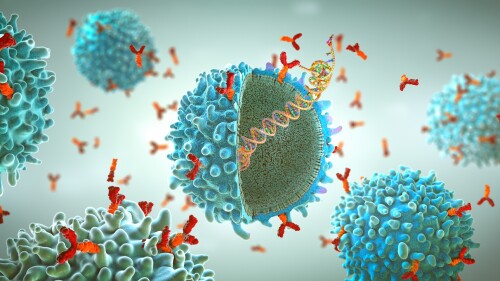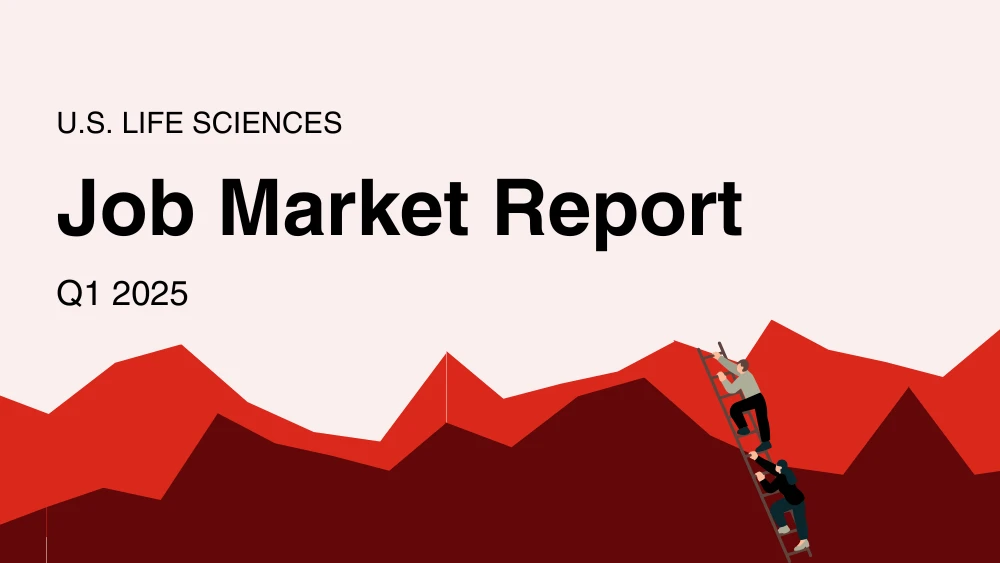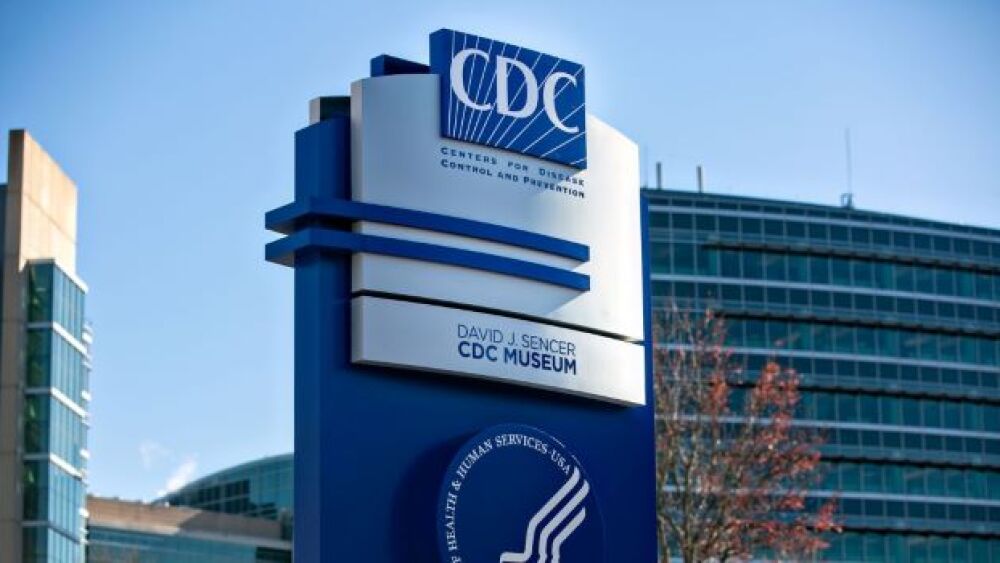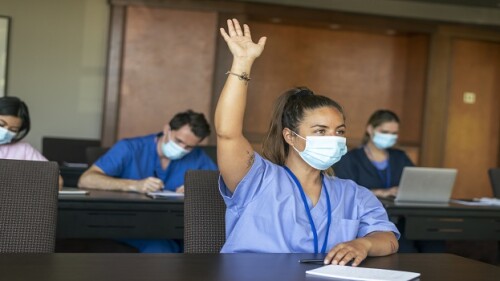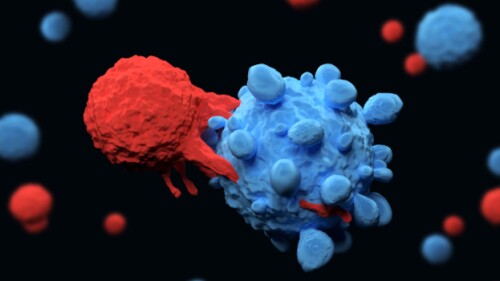Merck, Bristol Myers Squibb, Sanofi and Roche had little clarity on the potential impact of President Donald Trump’s pharmaceutical tariffs but many companies are already preparing for what’s to come.
Granite will focus on two antibody therapies, both targeting crucial players in the inflammatory cascade to address autoimmune diseases.
In this episode presented by DIA, BioSpace’s head of insights Lori Ellis discusses how collaboration and investment shape the the future of women’s health with Martin Hodosi, partner at Kearney and Melissa Laitner, director of strategic initiatives at the National Academy of Medicine.
With a new raise provided by Flagship Pioneering, the new company is aiming to find “the silent window” before disease symptoms set in.
The FDA is asking Novavax for a non-mandatory postmarketing commitment to produce additional clinical data for its investigational COVID-19 vaccine.
The tradipitant saga stretches back to September 2024, when the FDA declined to approve Vanda’s drug in gastroparesis, a stomach condition characterized by delayed gastric emptying.
FEATURED STORIES
Price-negotiation provisions that are out of step with reality are discouraging funders and Big Pharma partners from investing in potentially transformative therapies. Fixing some of the unintended consequences of the IRA will clear the way for innovative medicines to reach patients in need.
Non-opioid pain therapies are entering an unprecedented era, marked by the landmark FDA approval of Vertex’s Journavx and a growing number of alternative approaches. Their ultimate uptake, however, remains to be seen.
With the modality now in early clinical trials, experts say more efficiency, broader editing capabilities and delivery breakthroughs are needed to propel RNA editing to the next stage.
FROM BIOSPACE INSIGHTS
In a year when eradicated diseases are on the uptick in America, how will American children survive RFK Jr.’s vaccine scrutiny and inconsistency? Two experts call on pharma and regulatory bodies to rebuild trust.
LATEST PODCASTS
While women’s clinical trial participation has increased, clinical trials still largely are not designed for women. In this episode, we discuss the many areas where trials can be improved, such as human and historical diagnosis and screening biases, accessibility, data capturing, and more
Plus, how the geopolitical tensions with China will affect U.S. biopharma
Plus, another big buy points to strength of CDMO market and a new treatment for pulmonary arterial hypertension
Job Trends
Gilead Sciences, Inc. (Nasdaq:GILD) today announced new research to be presented at the European Association for the Study of the Liver (EASL) Congress, June 5-8, 2024 in Milan, Italy.
Subscribe to Genepool
Subscribe to BioSpace’s flagship publication including top headlines, special editions and life sciences’ most important breaking news
SPECIAL EDITIONS
A new generation of checkpoint inhibitors is emerging, with some showing more promise than others. From recent TIGIT failures to high-potential targets like VEGF, BioSpace explores what’s on the horizon in immuno-oncology.
Peter Marks, the venerable head of the FDA’s Center for Biologics Evaluation and Research, has been forced out. In this special edition of BioPharm Executive, BioSpace takes a deep dive into the instability of the HHS.
Year-over-year BioSpace data show biopharma professionals faced increased competition for fewer employment opportunities during the first quarter of 2025.
DEALS
-
Analysts predict a booming year for mergers and acquisitions, powered by obesity drug sales and pressure from upcoming patent expirations.
-
As evidenced by this week’s buyouts by J&J and Merck, Big Pharma appears to have found a sweet spot favoring smaller deals over megabillion-dollar acquisitions.
-
Merck on Wednesday announced a deal worth $3 billion to buy EyeBio and its first-in-class trispecific antibody Restoret, marking the pharma’s return to the ophthalmology space after nearly a decade.
-
Johnson & Johnson’s deal for Numab Therapeutics’ bispecific antibody NM26, slated to enter Phase II studies, comes on the heels of J&J’s $850 million Proteologix bispecific antibody acquisition.
-
The potential purchase by the Japanese conglomerate could secure access to Calliditas’ IgA nephropathy therapy Tarpeyo, which won the FDA’s full approval in December 2023.
WEIGHT LOSS
-
A study published Tuesday in The New England Journal of Medicine showed that children between the ages of six and 12 who took liraglutide for just over a year experienced a significant reduction in body mass index compared to placebo.
-
BioMarin’s new business strategy leaves investors with questions; Lykos CEO steps down; Terns releases compelling data on oral weight loss candidate; and more.
-
Phase I data for TERN-601 suggests Terns’ oral GLP-1 candidate for obesity could be a contender in the market next to big names like Lilly, Pfizer and Roche.
-
Terns Pharmaceuticals will advance TERN-601 into Phase II after early-stage data showed the oral therapy led to weight loss of 4.9%, comparable with weight loss pills Lilly and Pfizer are developing, according to analysts.
-
A broad indication for MariTide could help Amgen secure Medicare coverage for the treatment following FDA approval, CEO Robert Bradway said at Wednesday’s Morgan Stanley Global Healthcare Conference.
POLICY
-
The CDC’s Advisory Committee on Immunization Practices on Wednesday backed the use of Merck’s Capvaxive and Pfizer’s Prevnar 20 in adults between 50-64 years of age, opening a bigger market for the respective companies.
-
On election day, Tuesday, November 5, Americans will choose between former President Donald Trump and current Vice President Kamala Harris for their next president. The election will also see the rearrangement of Congress.
-
Monday’s lawsuits from Eli Lilly are the first to be filed by the pharma since the regulator officially removed tirzepatide from its drug shortage database earlier this month.
-
With Friday’s ruling by New Jersey District Judge Zahid Quraishi, Novartis joins a growing list of pharmaceutical companies that have failed in their legal challenges to the Inflation Reduction Act.
-
United States Pharmacopeia is recruiting expert volunteers from academia, industry, regulatory and healthcare to develop, revise and approve medicine, dietary supplement and food ingredient standards and solutions used in more than 150 countries to improve global public health. The volunteers will serve from 2025 to 2030.
Mentioning these certifications in your resume will set you apart from other candidates, clearing your path to your desired role. Learn here how to add certification to resume.
Applying to your first pharma internship may feel overwhelming, but it doesn’t have to be. Discover how to find, prepare for and be successful in an internship in the pharma industry in our guide.
Learn how to successfully hire interns. Also, find some tips on how to manage and support both in-office and remote interns in our comprehensive guide.
Just because everyone around you seems to be switching to a work-from-home position does not mean it is the right decision for you. It’s important to weigh the options carefully before you decide.
Finding the most cost-effective school for your undergraduate pharmaceutical degree can allow you to start working in the field without incurring astronomical student debt.
Peer review is integral to the scientific process, and one group plays a bigger role than you might think: Scientific Review Officers.
HOTBEDS
REPORTS
In this Employment Outlook report, BioSpace explores current workforce sentiment, job activity trends and the prospective job and hiring outlook for 2025, particularly as it compares to the previous year.
BioSpace’s third report on diversity, equity, inclusion and belonging in life sciences examines dramatic shifts in attitude around diversity initiatives.
CANCER
-
Truqap’s positive clinical data comes after it failed a late-stage study in metastatic triple-negative breast cancer. It helps AstraZeneca position itself as a top player in the prostate cancer space, alongside its Big Pharma colleagues.
-
ADC Therapeutics, Sutro Biopharma and Zai Lab are among those developing antibody-drug conjugates to address payload and toxicity challenges of current ADCs—and rapidly grow the multibillion-dollar market.
-
The agreement will give Kura enough capital to support the development and launch of its menin inhibitor ziftomenib.
-
Analysts are split on whether the positive trial results will help Merck stem future Keytruda losses as the mega-blockbuster goes off patent in 2028.
-
The deal has secured Novartis the chance to work with Ratio Therapeutics on a novel drug candidate that could fortify the Big Pharma against competition from would-be radiopharmaceutical rivals such as BMS and Lilly.
NEUROSCIENCE
-
As the FDA prepares to render a verdict on BMS’ closely watched schizophrenia drug, BioSpace takes a closer look at the late-stage pipeline for this neuropsychiatric disorder.
-
The positive readout in patients with non-relapsing secondary progressive multiple sclerosis comes on the heels of back-to-back failures in which tolebrutinib was unable to improve relapse rates in patients with relapsing MS.
-
Launched in 2020 to more quickly bring to market an effective medicine for amyotrophic lateral sclerosis, the HEALEY Platform Trial has generated disappointing results for many but also continuing programs from Clene and Prilenia.
-
The FDA has six target action dates ahead to round out September as drugs for gastroparesis, Niemann-Pick disease type C and more await decisions.
-
BMO Capital Markets analyst Evan Seigerman said luvadaxistat’s inconsistencies between mid-stage trials raise questions about Neurocrine Biosciences’ developmental efforts moving forward.
CELL AND GENE THERAPY
-
Lexeo Therapeutics’ investigational gene therapy reduces left ventricular volume and wall thickness in patients with Friedreich’s ataxia, according to a small study.
-
Interius BioTherapeutics has received approval from Australia’s Human Research Ethics Committee to begin the first-in-human trial of an investigational in vivo CAR-T therapy designed to treat B-cell malignancies.
-
Following a disappointing readout last year, uniQure on Tuesday posted promising Phase I/II data for its investigational gene therapy AMT-130 and nabbed the first-ever Regenerative Medicine Advanced Therapy designation from the FDA in Huntington’s disease.
-
The groundwork being done in 2024 is building the foundation for global collaboration in the future.
-
Johnson & Johnson and Legend Biotech’s Carvykti cell therapy significantly improved survival in patients with multiple myeloma when used in the second-line setting, the companies announced on Tuesday.















































































